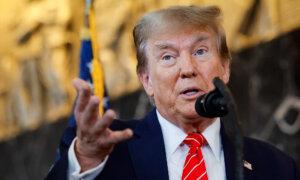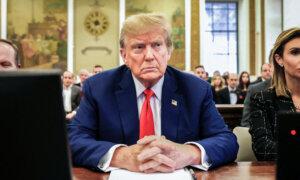A Supreme Court decision and various appeals could change the trajectory of the 2024 presidential campaign.
Former President Donald Trump is preparing to traverse a rocky campaign trail in February and March as he juggles multiple court battles and relatively untested legal questions that could impact the 2024 race.
Although he’s already won the Iowa caucuses and New Hampshire primary by double-digit margins, several primaries await President Trump in February and March against his only remaining competitor, former United Nations Ambassador Nikki Haley.
Her home state of South Carolina is holding its primary—often viewed as a bellwether—on Feb. 24 with more than 20 primaries and caucuses occurring in the following weeks. But before Ms. Haley and President Trump duke it out on Super Tuesday on March 4, the Supreme Court will hear oral arguments over whether President Trump is even allowed to compete.
“This is going to be—and I can’t stress this enough—this is going to be a fascinating year,” Keith Johnson, a criminal defense attorney in Georgia, told The Epoch Times. “This is going to be one of the most historic years when we look at the intersection of law and politics at the highest levels.”
On Feb. 8, the U.S. Supreme Court will consider whether section 3 of the 14th Amendment effectively precludes President Trump from appearing on its ballot. Both Maine’s secretary of state and the Colorado Supreme Court, whose decision is being reviewed by the justices, have echoed lawsuits across the country arguing that President Trump engaged in the type of insurrection disqualifying what Section 3 describes as “officer[s] of the United States.”
President Trump’s legal team has argued, as a lower court in Colorado indicated, that he is not the type of officer referred to in the post-Civil War amendment. That argument is just one of many off-ramps SCOTUS could take in maintaining President Trump’s eligibility, even if it’s just temporarily.
“There are many, many arguments that the Supreme Court could use to overturn that decision,” Heritage Foundation Vice President of the Institute for Constitutional Government John Malcolm told The Epoch Times.
He said “the neatest and cleanest arguments are” that presidents appoint officers of the United States, but aren’t ones themselves, and that courts cannot enforce Section 3 without prior action from Congress. Wading into the definition of an insurrection might be more complex as indicated by a lengthy lower court opinion in which Colorado Judge Sarah Wallace weighed evidence on the issue. As Mr. Malcolm indicated, the insurrection accusation is questionable given that Special Counsel Jack Smith hasn’t charged President Trump under the federal insurrection ban.
Mr. Malcolm and Mr. Johnson told The Epoch Times that it was very unlikely the Supreme Court would uphold Colorado’s disqualification of President Trump.
Facing growing calls for reform and declining favorability after overturning Roe v. Wade, the Supreme Court is heading into a year of immense institutional pressure. Jan. 6-related cases and hot-button social issues are coming alongside President Trump’s various trials, which will likely produce numerous appeals as they make their way through the judiciary. Much of President Trump’s current legal troubles ensnare questions about the legitimacy of the prior election and, as Mr. Johnson indicated, “the thinking of the court could be the last thing we need as a country is another election that is delegitimized.”
The Court could theoretically rule Congress needs to weigh in before the courts can act. If it does, it will likely set up an irresolvable scenario for the highly polarized, often gridlocked legislative branch before November.
Presidential Immunity
Complicating matters is the relatively untested nature of other legal questions confronting him in the courts. Besides Section 3, the legal concepts of executive privilege and presidential immunity are likely to come up amid uncertainty as to how exactly they protect former presidents.
President Trump has asked the U.S. Court of Appeals for the D.C. Circuit to reconsider his argument that presidential immunity should result in Special Counsel Jack Smith’s prosecution of him being dismissed. Observers, however, have speculated after oral argument on Jan. 9 that he’s unlikely to succeed with the panel of three judges who heard the case.
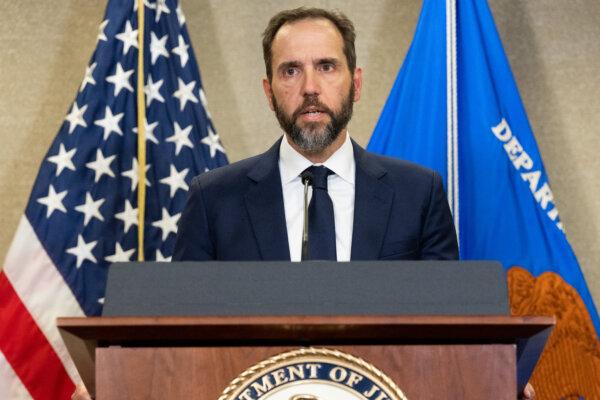
“I would be shocked if it’s anything less than 3–0,” former U.S. Attorney Neama Rahmani said, referring to the vote count. He argued that President Trump’s attorney “took such an unreasonable position” that amounted to “anything a former or current president [has] done is immune.”
President Trump’s attorney, D. John Sauer, had argued the Constitution’s impeachment clause required Congress to convict presidents before prosecutors charged them in court. He fielded a range of hypotheticals from Judge Florence Pan, who wondered whether that immunity would cover a president ordering SEAL Team 6 to assassinate a political rival.
Constitutional attorney Gayle Trotter told The Epoch Times that those hypotheticals were “extremes” that don’t need to “influence the analysis of the entire case.” She added that “those types of extreme examples” likely won’t factor in the U.S. Supreme Court’s decision.
It’s been nearly a month since the D.C. Circuit heard oral argument and they’re not bound by any deadline for issuing an opinion. “I expect to get something pretty soon,” Mr. Rahmani speculated. If President Trump loses, he will likely appeal the D.C. Circuit’s opinion to the U.S. Supreme Court after requesting an en banc hearing in which all the circuit judges consider his appeal.
It remains unclear how the Supreme Court will rule in those cases or others that arise from President Trump’s ongoing trials. The possibilities are expansive given the number of legal questions involved and judicial avenues available to the justices.
Executive Privilege
Presidential immunity and executive privilege were debated during the Nixon era but courts haven’t historically established extensive precedent on those issues—both of which rest on tradition rather than explicit Constitutional guarantees.
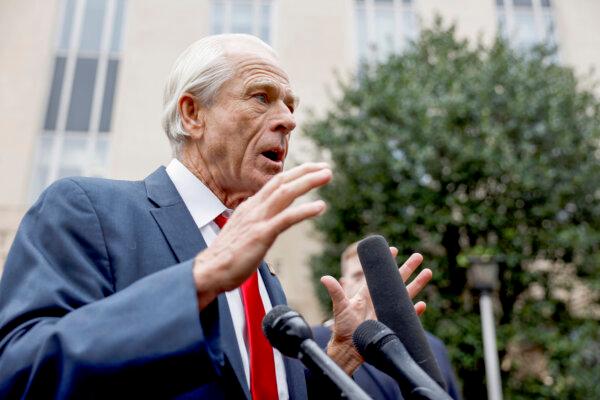
Mr. Navarro has described his case as unprecedented and headed for the Supreme Court, which multiple attorneys expected to weigh in on this relatively ambiguous area of the law. Ms. Trotter speculated that President Trump’s direct claims to executive privilege—specifically in his court cases—will be the most likely to reach the Supreme Court. Besides analyzing whether President Trump has privilege according to his specific circumstances, the justices could also touch on the unknown question of whether current presidents can refuse to extend privilege to former ones.
If President Trump succeeds in his presidential immunity case, it could spell the end of his D.C. trial while potentially throwing a wrench in both his Georgia trial and future litigation. That would help clear his schedule for campaigning more in person and less from the courtroom.
Juggling Political and Legal Priorities
Prolonging the trial process would make traditional campaigning more difficult but judges may make allowances for him as he’s in the middle of a presidential run. However, President Trump is also poised to benefit from prolonging his trials as doing so would make it more likely that he could either pardon himself or cease DOJ’s prosecutions upon taking office.
“Trump’s image has been improving across the board even before the indictments,” Big Data Poll Director Rich Baris told The Epoch Times.
“[Trump’s legal] prospects … are going to be greatly influenced by whether he can make this into a political issue,” Mr. Johnson told The Epoch Times. Jury selection in particular could be problematic for prosecutors because of President Trump’s high public profile.
“The biggest issue” for prosecutors is whether they can “get a person on a jury who may be conservative, who may have voted for Trump once, maybe twice, to convict him of those offenses,” Mr. Johnson said. Even if a juror didn’t vote for President Trump, Mr. Johnson suggested they may see the prosecutions as a “waste of resources.”
Questions have arisen about a possible delay in the Florida classified documents case but Judge Aileen Cannon, refused a delay in November. It’s currently slated for May 20 and could be a “very problematic case” for President Trump, Mr. Johnson told The Epoch Times.
“Either the documents are classified, or they’re not. Either he had authority to remove them, and take them to his private residence, or not,” he said. “And either he was made aware that they needed to be returned ASAP, or not. I believe there will be testimony that not only was he ignoring those correspondences, but he was actively trying to conceal the documents.” President Trump has denied wrongdoing.
Fulton County District Attorney Fani Willis is seeking an August trial date in Georgia but that could be pushed back if it’s anything like President Trump’s D.C. case. That trial was scheduled to start on March 4 but D.C. Judge Tanya Chutkan issued an order on Feb. 2 canceling that date and indicating it could be rescheduled.
Nikki Haley Walks a Fine Line
Moving that trial date could mean Ms. Haley will face less scrutiny about President Trump’s ongoing cases and his role in Jan. 6—issues she’s appeared reluctant to address.
“The fundamental thing is that Republicans overwhelmingly believe that Trump is being railroaded,” Ethics and Public Policy Center senior fellow Henry Olsen told The Epoch Times. He added that while Ms. Haley’s path to the GOP nomination isn’t through the “MAGA” base, “she needs to win a substantial percentage of people who like Trump, and think that he’s being railroaded, but would be willing to look at somebody else.”
Florida Gov. Ron DeSantis, Mr. Olsen suggested, “failed” to take that path before dropping out of the race in January. “It makes no sense for [Ms. Haley] to basically become the [former New Jersey Gov.] Chris Christie in the race. … She’s doing exactly what she needs to do, which is criticizing Trump, drawing a contrast, but not being sucked into the anti-Trump derangement syndrome resistance.”

That $50 million figure was just for 2023 before President Trump’s trials even start. On March 25, he’s supposed to start his criminal case in New York, which involves alleged hush money to Stormy Daniels. At that point, though, the party may have decided on a presumptive nominee as Super Tuesday and a series of other primaries on March 19 and 23 will have passed.
If he becomes the presumptive nominee, President Trump’s trials could force the party to reckon with greater transparency through pre-trial discovery, convictions, and a nominee limited by the time demands of his legal battles.
Haley’s ‘Momentum’ After New Hampshire
To compete against President Biden, Ms. Haley has to defeat President Trump, who has a solid base of support within the party. President Trump also already won the Iowa caucuses and New Hampshire primary where Ms. Haley lost even with an apparent shift of voters after Mr. DeSantis exited the race. When he was still running, she only got 19 percent of the votes in Iowa. After he exited the race, she got 43.2 percent of the vote in New Hampshire compared to President Trump’s 54.3 percent.
Building on that momentum is something she hopes will keep her in the race. She repeatedly evaded recent questions from NBC about whether she could stay in the race if she lost South Carolina, where she previously served as governor. Eventually, Ms. Haley said she needed to do better than she did in New Hampshire.
“Nikki Haley is down between 50–60 points nationally, and between 25–40 points in South Carolina,” Mr. Baris told The Epoch Times. “She has no viable path forward in either South Carolina or in the delegate math.” Mr. Olsen, meanwhile, agreed with Ms. Haley that she could stay in the race if she lost South Carolina, noting that trailing President Trump by as little as 4 percent could show she’s gaining momentum.
During her NBC interview, Ms. Haley said she didn’t want to be “anyone’s vice president” and has appeared to downplay an interest in securing support from “MAGA” Republicans. Yet, she has to walk a fine line as she’s committed to supporting the eventual Republican nominee even after bashing the former president on the campaign trail.
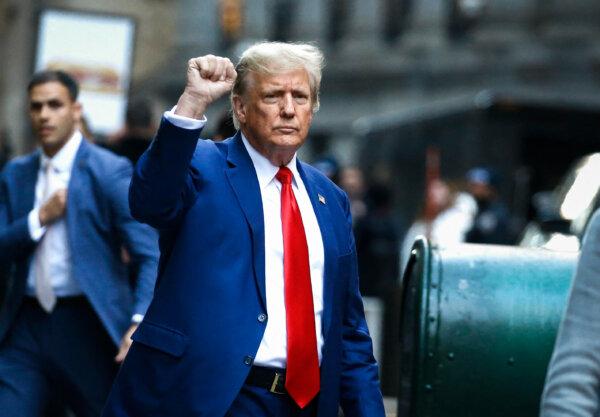
Regardless of Ms. Haley’s success, President Trump’s critics and supporters alike seem to agree that, despite the onslaught of legal troubles, he has lived up to his nickname “Teflon Don.”
“Trump has this ironclad grip on the party … he’s made out of Teflon or steel, or whatever you want to say,” Mr. Rahmani said. “He’s just immune and the normal rules don’t apply to him. Anyone else, even if there was an indictment … they’d have to resign. He just gets more strength. It’s just, it’s fascinating.”
Mr. Rahmani added that President Trump “could be convicted, and there’s still a possibility that he wins, which is crazy to me as a lawyer and a former prosecutor, but I just would never, at this point, put anything past him.”
Original News Source Link – Epoch Times
Running For Office? Conservative Campaign Consulting – Election Day Strategies!

